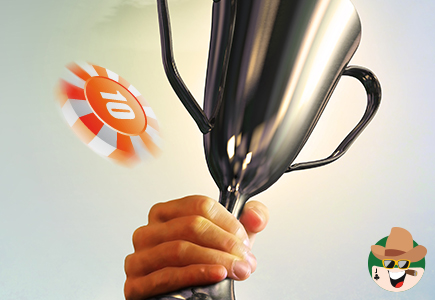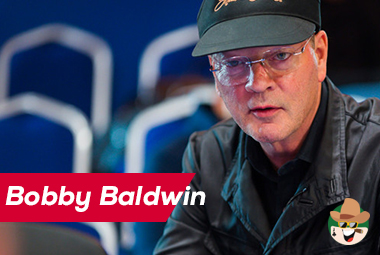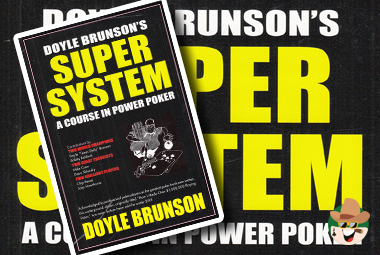
Doyle Brunson has few peers in the world of poker who can stand up to him. He is a winning poker player who has beaten the best during a career that has lasted more than 60 years.
But there is one player who can stand up to him and that player's name is Bobby Baldwin.
A native of Tulsa, OK., Baldwin hasn't made much noise in the poker press since the 1970s. That was when he won his fourth WSOP bracelet. He has won the WSOP main tournament as well as the 2-7 stud tournament, piling up tournament winnings of nearly $3 million. For the past three decades, Baldwin has been a casino executive, working in high executive positions for the Golden Nugget, Mirage, Bellagio and the Mandalay Group of casino resorts.
In the early 1970s, Brunson wrote his best-selling poker strategy book, 'Super System: A Course in Power Poker.' He chose Baldwin, whose nickname is 'The Owl,' to write a chapter on limit Texas Hold'em.

In his introduction to Baldwin, a be-spectacled soft-spoken Oklahoman, Brunson describes why he selected Baldwin to be his expert on limit Hold'em.
'Bobby won all the money again,' Doyle begins the chapter. 'That's what my friend Iron Man told me a couple of years ago during one of his frequent visits to Vegas. After having played 20 years in Texas, I was naturally curious. Every time I talked, I got the same answer...some young kid I didn't even know had taken over where I had left off. I couldn't believe it possible that some unknown like Bobby Baldwin would come along and dominate the group of good poker players I knew inhabited the southern states.
'Quite frankly, I was getting pretty irritated hearing about this Bobby. I thought, wait until I get this kid across the table from me. I'll destroy him.'
Well, Doyle and Bobby finally met and it was Baldwin who did the destroying.
In their first clashes in Texas Hold'em, Baldwin used his professionalism, diligence and intensity to add more than $40,000 to his stack of chips. Brunson added, smiling, 'I knew how Pat Garrett must have felt about Billy the Kid about 100 years ago.'
Doyle enjoyed matching wits with The Owl. He was amazed that Baldwin, then in his early 20s, had mastered tactics and moves that took him years to perfect. It was only natural that he would select Baldwin to be his expert in limit Hold'em in his classic book.
I met Baldwin on one of my weekends in Las Vegas. The World Series of Poker was in full competition and I was trying to locate Brunson for an interview. I remember shaking hands with Baldwin at the beautiful Golden Nugget Casino and following him from room to room trying to run down Texas Dolly. Baldwin was gracious, business-like, and convinced he could find Brunson and sure enough, after about 20 minutes, we located him.
'Here's your reporter,' he announced to Doyle, who just smiled and got up from his table.
Brunson heaped a lot of praise on Baldwin in his book, calling him an 'all-around poker player' as well as an expert on Hold'em. The Owl won both the seven-card stud championship and the deuce to seven lowball championship in the 1977 WSOP. He also made it to the final table that year. About him, Doyle wrote, 'He has so much raw talent that he can hold his own in any poker game. And he is so super-aggressive that I sometimes wonder if he doesn't get a sore arm from shoving in all his chips so often.'
For years, Baldwin was a road gambler who preferred to play in the games in Texas and Oklahoma rather than move to Las Vegas. But after he decided to relocate to the City that Never Sleeps, he burst on the scene like a wildfire.
Here are just a few of his tips on how to be an effective limit Hold'em poker player. For years, Baldwin played $10-20 Texas Hold'em at the Golden Nugget, which in those early years was one of his favorite casinos.
'The nature of limit Hold'em makes it necessary to keep a tighter rein on your aggressive play. But when you play a pot, you play it strongly, much as in no-limit. That is Power Poker.
'Besides being able to assess the strength of the hands out against you accurately, it's usually necessary to start out with an above-average hand. This means, very simply, playing big cards most of the time. This straightforward nature of limit Hold'em means that most of the time you have to show down a hand, and you will make the best hand more often with big cards than little ones.
''In limit Hold'em, you can't take a 7-6 suited and double-through a man with two aces because he does not have to jeopardize very many chips. Consequently, the small suited connectors, which are my favorite no-limit hands, are not as valuable when I can't move all-in on a man. I can still play them, but the situation has to be right.
'Lack of patience and self-discipline are the downfall of many players who otherwise are technically sound enough to be winners. I have seen many players who go on tilt when they get a bad beat, and their play deteriorates to the point where they have almost no chance to win.'
Baldwin assesses his opponents on many levels -- the number of hands the person plays, whether he bets a lot or is a calling station, whether he bluffs, can he be bluffed, is he a weak player or does he have good solid knowledge of the game, does a bad beat throw him off, and does he always play hands the same way or can he change gears and mix up his play?

'Once you decide to play your hand, the decisions you make on the flop are the most important. Fourth Street presents fewer intricacies. The final decision on fifth street is almost always simple and relatively mechanical.
'Create doubt in your opponents' minds or you will be too easy to read. This means departing occasionally from your basic style and raising with calling hands in mid-position -- for example, 9-10 suited.
'Position is always a big consideration in both limit and no-limit Hold'em. You cannot consistently take marginal hands in bad positions like the blind or early position.
''In the three spots to the left of the blind, you should have a hand you can either raise with or that is strong enough to stand a raise -- aces, kings, queens, A-K suited or not suited, A-Q or K-Q suited. You can also play the medium pairs, eights to jacks. Anything else is marginal.
''Raising with queens or other big pairs helps thin out the field. You don't want to let too many people into the pot with a big pair since this would cut in half your chances of winning the pot.
'There are two sound reasons for raising with big pairs and A-K -- you get more money in with a good hand, and you can narrow down the number of foes, which is the more important reason.
'A-X suited is an overrated Hold'em hand. Play it for as little money as possible since its value is when you turn a flush draw, which happens one out of nine times. You only make a flush about five percent of the times you hold the hand.'
In 5th through 7th positions, you can loosen up your standards a bit since your chances of getting raised are lessened. You should raise or re-raise with the top hands, aces, kings and A-K
'Remember to play solid in front and loose in the back. And don't play a short-handed pot with less than a premium hand.'
Good luck The Owl's advice is solid and you would be wise to follow it.
Author: Geno Lawrenzi Jr.
(Geno Lawrenzi Jr. is an international journalist, magazine author and ghostwriter and poker player who lives in Phoenx, AZ. He has published 2,000 articles in 50 magazines and 125 newspapers. If you want to share a gambling story or book idea with him, send an email to glawrenzi@gmail.com ).





